John Locke: Examining His Contributions to Society and Thought
VerifiedAdded on 2023/04/25
|5
|1114
|465
Essay
AI Summary
This essay provides a biographical review of John Locke, a prominent figure of the Enlightenment period. It examines his early life, key ideas, and significant works in epistemology, empiricism, political philosophy, and education. The essay highlights Locke's contributions to religious tolerance, democracy, and liberalism, emphasizing his role in shaping an egalitarian society. It discusses his major works, including "An Essay Concerning Human Understanding," "Some Thoughts Concerning Education," "A Letter Concerning Toleration," and "Two Treatises of Government," and their impact on philosophical and political thought. The essay also touches on Locke's influence on the Whig movement and his intellectual interactions with other prominent figures of the time. The essay concludes by summarizing Locke's lasting legacy as a foundational thinker of modern Western thought.
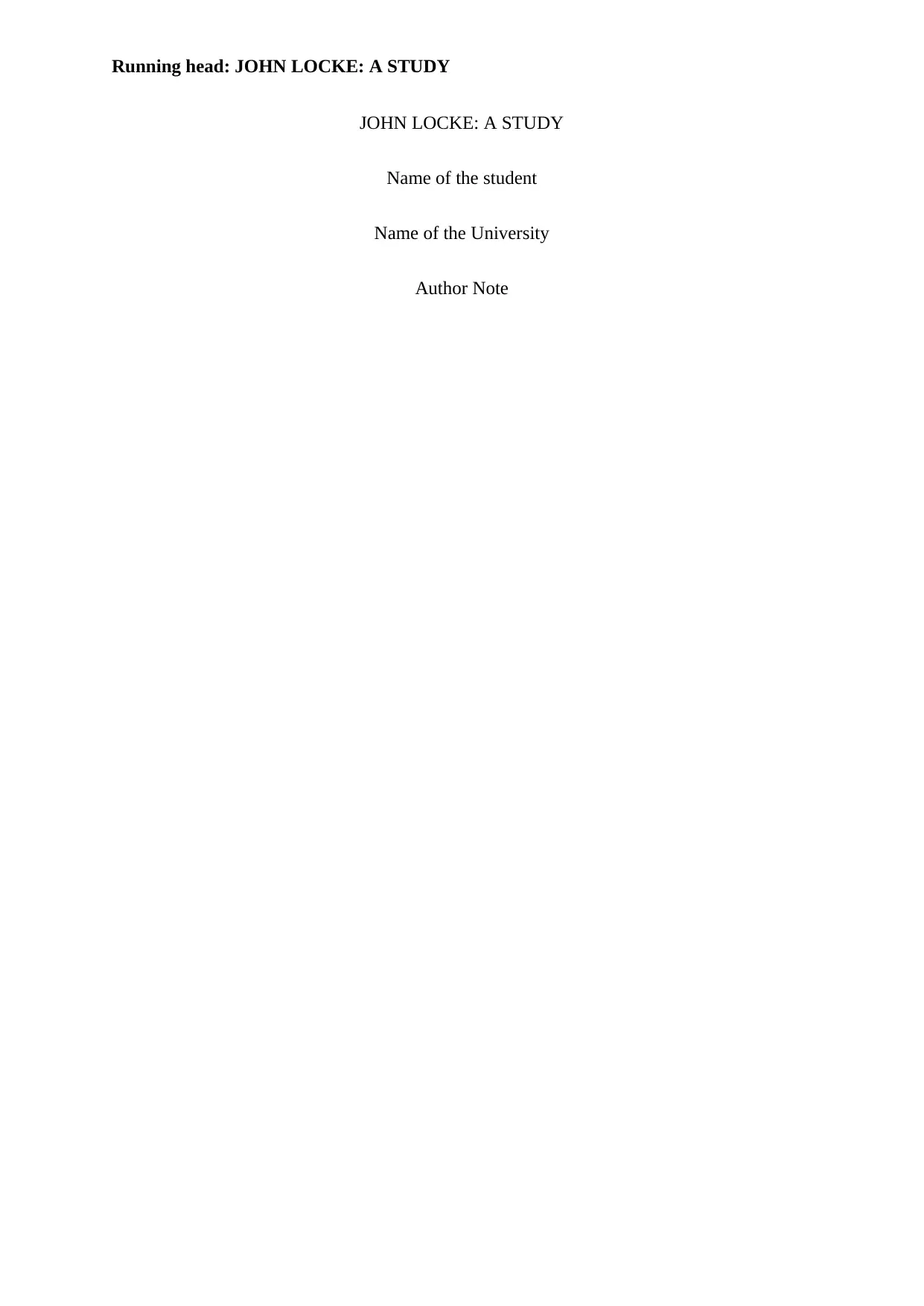
Running head: JOHN LOCKE: A STUDY
JOHN LOCKE: A STUDY
Name of the student
Name of the University
Author Note
JOHN LOCKE: A STUDY
Name of the student
Name of the University
Author Note
Paraphrase This Document
Need a fresh take? Get an instant paraphrase of this document with our AI Paraphraser
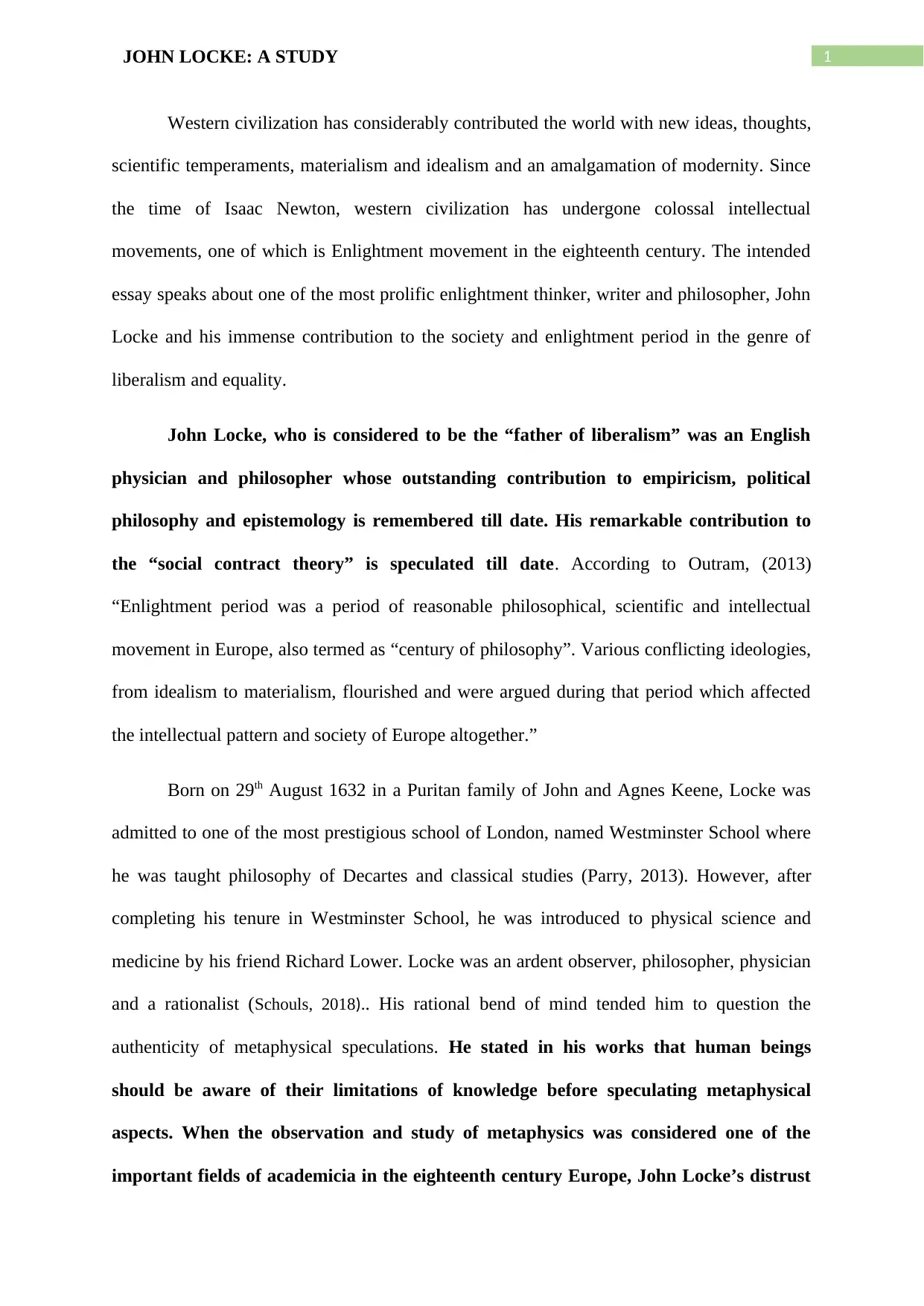
1JOHN LOCKE: A STUDY
Western civilization has considerably contributed the world with new ideas, thoughts,
scientific temperaments, materialism and idealism and an amalgamation of modernity. Since
the time of Isaac Newton, western civilization has undergone colossal intellectual
movements, one of which is Enlightment movement in the eighteenth century. The intended
essay speaks about one of the most prolific enlightment thinker, writer and philosopher, John
Locke and his immense contribution to the society and enlightment period in the genre of
liberalism and equality.
John Locke, who is considered to be the “father of liberalism” was an English
physician and philosopher whose outstanding contribution to empiricism, political
philosophy and epistemology is remembered till date. His remarkable contribution to
the “social contract theory” is speculated till date. According to Outram, (2013)
“Enlightment period was a period of reasonable philosophical, scientific and intellectual
movement in Europe, also termed as “century of philosophy”. Various conflicting ideologies,
from idealism to materialism, flourished and were argued during that period which affected
the intellectual pattern and society of Europe altogether.”
Born on 29th August 1632 in a Puritan family of John and Agnes Keene, Locke was
admitted to one of the most prestigious school of London, named Westminster School where
he was taught philosophy of Decartes and classical studies (Parry, 2013). However, after
completing his tenure in Westminster School, he was introduced to physical science and
medicine by his friend Richard Lower. Locke was an ardent observer, philosopher, physician
and a rationalist (Schouls, 2018).. His rational bend of mind tended him to question the
authenticity of metaphysical speculations. He stated in his works that human beings
should be aware of their limitations of knowledge before speculating metaphysical
aspects. When the observation and study of metaphysics was considered one of the
important fields of academicia in the eighteenth century Europe, John Locke’s distrust
Western civilization has considerably contributed the world with new ideas, thoughts,
scientific temperaments, materialism and idealism and an amalgamation of modernity. Since
the time of Isaac Newton, western civilization has undergone colossal intellectual
movements, one of which is Enlightment movement in the eighteenth century. The intended
essay speaks about one of the most prolific enlightment thinker, writer and philosopher, John
Locke and his immense contribution to the society and enlightment period in the genre of
liberalism and equality.
John Locke, who is considered to be the “father of liberalism” was an English
physician and philosopher whose outstanding contribution to empiricism, political
philosophy and epistemology is remembered till date. His remarkable contribution to
the “social contract theory” is speculated till date. According to Outram, (2013)
“Enlightment period was a period of reasonable philosophical, scientific and intellectual
movement in Europe, also termed as “century of philosophy”. Various conflicting ideologies,
from idealism to materialism, flourished and were argued during that period which affected
the intellectual pattern and society of Europe altogether.”
Born on 29th August 1632 in a Puritan family of John and Agnes Keene, Locke was
admitted to one of the most prestigious school of London, named Westminster School where
he was taught philosophy of Decartes and classical studies (Parry, 2013). However, after
completing his tenure in Westminster School, he was introduced to physical science and
medicine by his friend Richard Lower. Locke was an ardent observer, philosopher, physician
and a rationalist (Schouls, 2018).. His rational bend of mind tended him to question the
authenticity of metaphysical speculations. He stated in his works that human beings
should be aware of their limitations of knowledge before speculating metaphysical
aspects. When the observation and study of metaphysics was considered one of the
important fields of academicia in the eighteenth century Europe, John Locke’s distrust
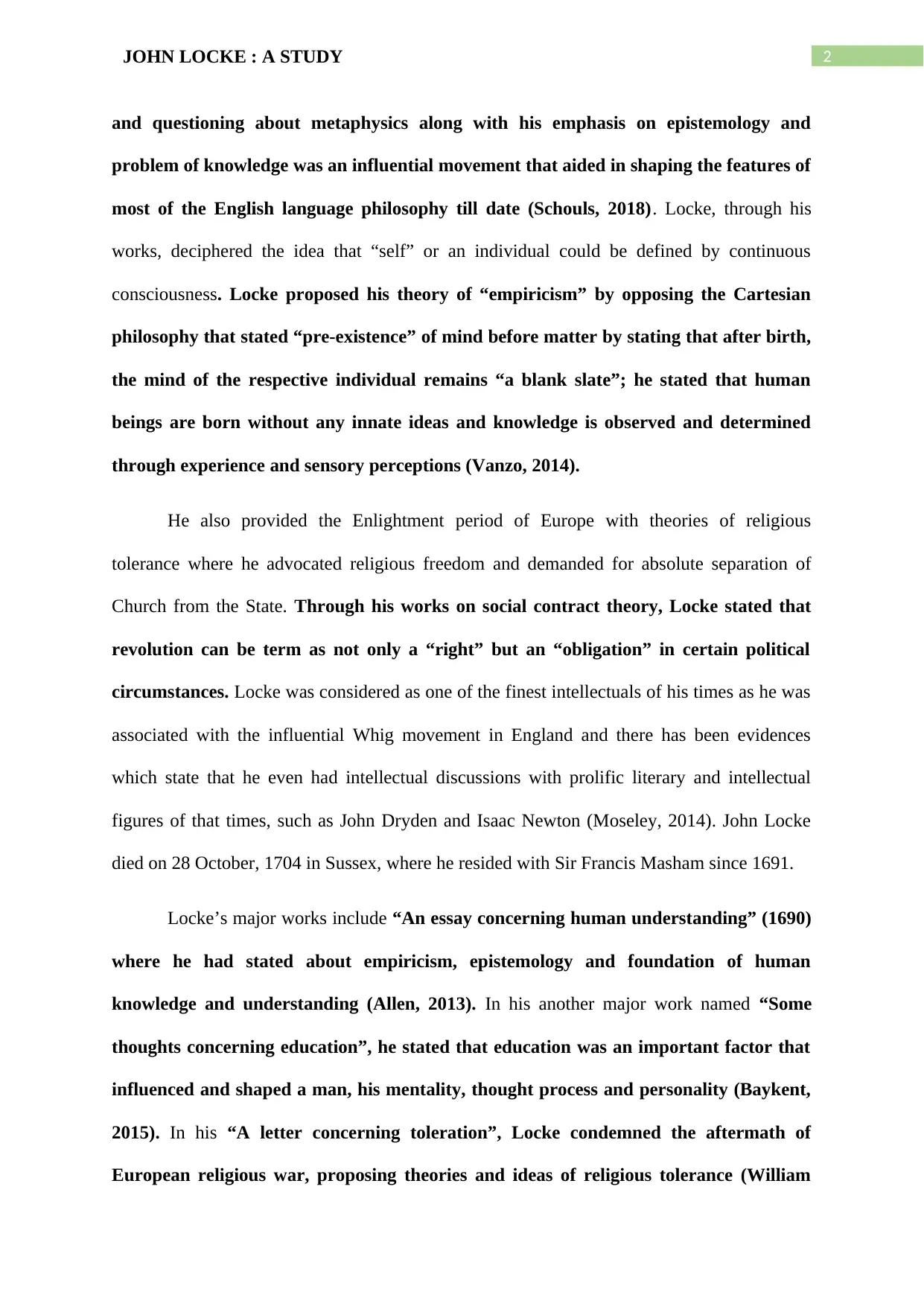
2JOHN LOCKE : A STUDY
and questioning about metaphysics along with his emphasis on epistemology and
problem of knowledge was an influential movement that aided in shaping the features of
most of the English language philosophy till date (Schouls, 2018). Locke, through his
works, deciphered the idea that “self” or an individual could be defined by continuous
consciousness. Locke proposed his theory of “empiricism” by opposing the Cartesian
philosophy that stated “pre-existence” of mind before matter by stating that after birth,
the mind of the respective individual remains “a blank slate”; he stated that human
beings are born without any innate ideas and knowledge is observed and determined
through experience and sensory perceptions (Vanzo, 2014).
He also provided the Enlightment period of Europe with theories of religious
tolerance where he advocated religious freedom and demanded for absolute separation of
Church from the State. Through his works on social contract theory, Locke stated that
revolution can be term as not only a “right” but an “obligation” in certain political
circumstances. Locke was considered as one of the finest intellectuals of his times as he was
associated with the influential Whig movement in England and there has been evidences
which state that he even had intellectual discussions with prolific literary and intellectual
figures of that times, such as John Dryden and Isaac Newton (Moseley, 2014). John Locke
died on 28 October, 1704 in Sussex, where he resided with Sir Francis Masham since 1691.
Locke’s major works include “An essay concerning human understanding” (1690)
where he had stated about empiricism, epistemology and foundation of human
knowledge and understanding (Allen, 2013). In his another major work named “Some
thoughts concerning education”, he stated that education was an important factor that
influenced and shaped a man, his mentality, thought process and personality (Baykent,
2015). In his “A letter concerning toleration”, Locke condemned the aftermath of
European religious war, proposing theories and ideas of religious tolerance (William
and questioning about metaphysics along with his emphasis on epistemology and
problem of knowledge was an influential movement that aided in shaping the features of
most of the English language philosophy till date (Schouls, 2018). Locke, through his
works, deciphered the idea that “self” or an individual could be defined by continuous
consciousness. Locke proposed his theory of “empiricism” by opposing the Cartesian
philosophy that stated “pre-existence” of mind before matter by stating that after birth,
the mind of the respective individual remains “a blank slate”; he stated that human
beings are born without any innate ideas and knowledge is observed and determined
through experience and sensory perceptions (Vanzo, 2014).
He also provided the Enlightment period of Europe with theories of religious
tolerance where he advocated religious freedom and demanded for absolute separation of
Church from the State. Through his works on social contract theory, Locke stated that
revolution can be term as not only a “right” but an “obligation” in certain political
circumstances. Locke was considered as one of the finest intellectuals of his times as he was
associated with the influential Whig movement in England and there has been evidences
which state that he even had intellectual discussions with prolific literary and intellectual
figures of that times, such as John Dryden and Isaac Newton (Moseley, 2014). John Locke
died on 28 October, 1704 in Sussex, where he resided with Sir Francis Masham since 1691.
Locke’s major works include “An essay concerning human understanding” (1690)
where he had stated about empiricism, epistemology and foundation of human
knowledge and understanding (Allen, 2013). In his another major work named “Some
thoughts concerning education”, he stated that education was an important factor that
influenced and shaped a man, his mentality, thought process and personality (Baykent,
2015). In his “A letter concerning toleration”, Locke condemned the aftermath of
European religious war, proposing theories and ideas of religious tolerance (William
⊘ This is a preview!⊘
Do you want full access?
Subscribe today to unlock all pages.

Trusted by 1+ million students worldwide
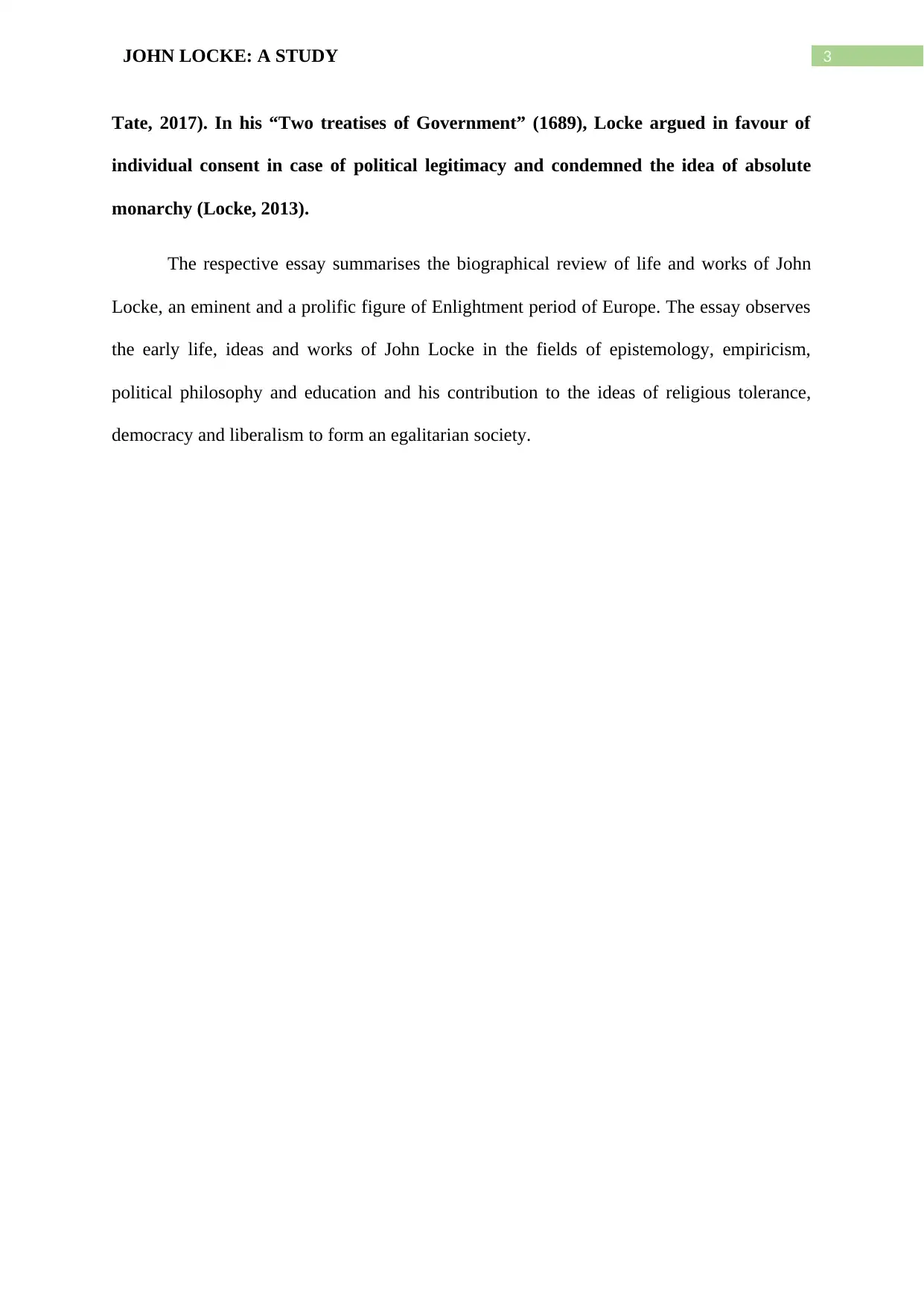
3JOHN LOCKE: A STUDY
Tate, 2017). In his “Two treatises of Government” (1689), Locke argued in favour of
individual consent in case of political legitimacy and condemned the idea of absolute
monarchy (Locke, 2013).
The respective essay summarises the biographical review of life and works of John
Locke, an eminent and a prolific figure of Enlightment period of Europe. The essay observes
the early life, ideas and works of John Locke in the fields of epistemology, empiricism,
political philosophy and education and his contribution to the ideas of religious tolerance,
democracy and liberalism to form an egalitarian society.
Tate, 2017). In his “Two treatises of Government” (1689), Locke argued in favour of
individual consent in case of political legitimacy and condemned the idea of absolute
monarchy (Locke, 2013).
The respective essay summarises the biographical review of life and works of John
Locke, an eminent and a prolific figure of Enlightment period of Europe. The essay observes
the early life, ideas and works of John Locke in the fields of epistemology, empiricism,
political philosophy and education and his contribution to the ideas of religious tolerance,
democracy and liberalism to form an egalitarian society.
Paraphrase This Document
Need a fresh take? Get an instant paraphrase of this document with our AI Paraphraser
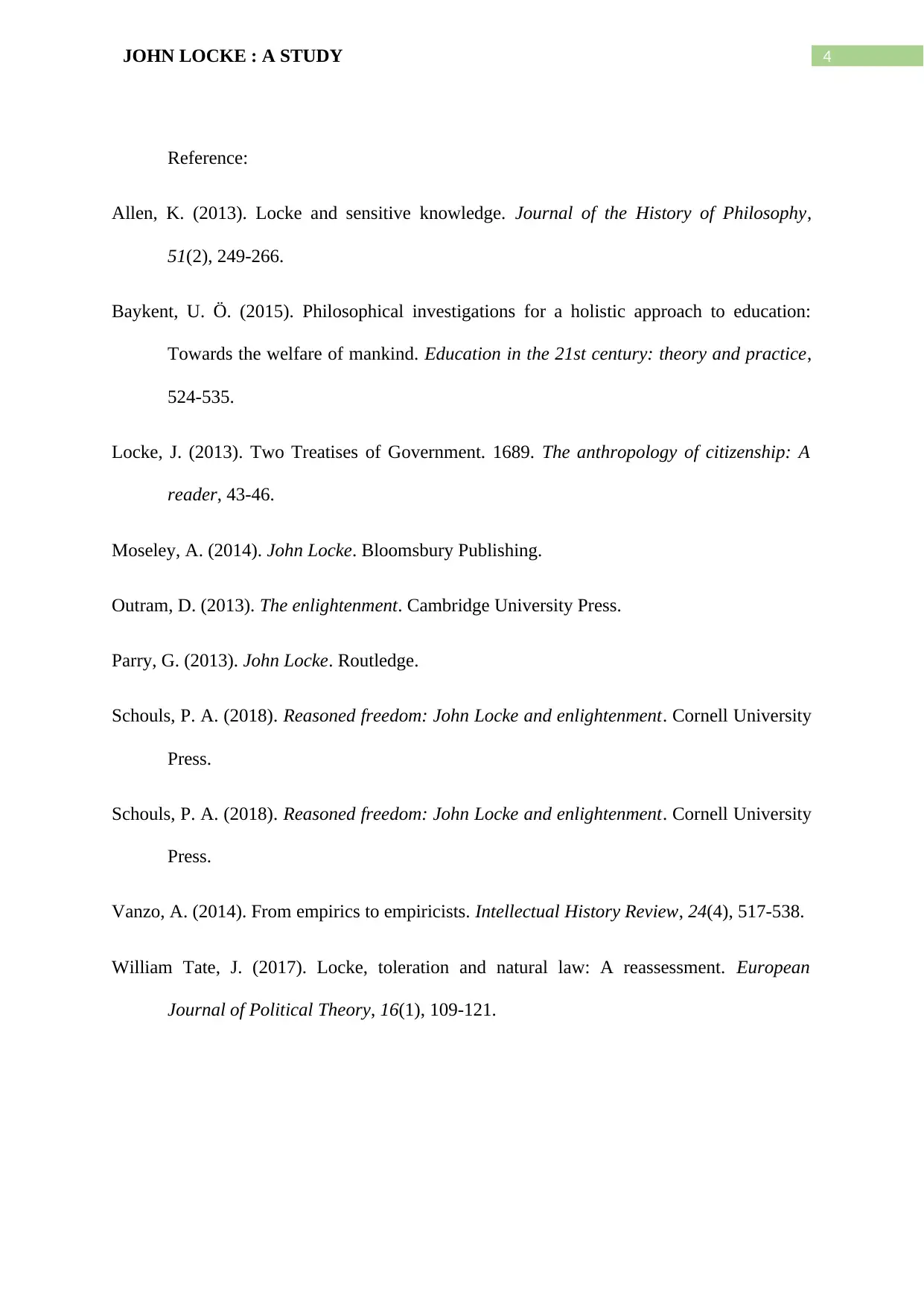
4JOHN LOCKE : A STUDY
Reference:
Allen, K. (2013). Locke and sensitive knowledge. Journal of the History of Philosophy,
51(2), 249-266.
Baykent, U. Ö. (2015). Philosophical investigations for a holistic approach to education:
Towards the welfare of mankind. Education in the 21st century: theory and practice,
524-535.
Locke, J. (2013). Two Treatises of Government. 1689. The anthropology of citizenship: A
reader, 43-46.
Moseley, A. (2014). John Locke. Bloomsbury Publishing.
Outram, D. (2013). The enlightenment. Cambridge University Press.
Parry, G. (2013). John Locke. Routledge.
Schouls, P. A. (2018). Reasoned freedom: John Locke and enlightenment. Cornell University
Press.
Schouls, P. A. (2018). Reasoned freedom: John Locke and enlightenment. Cornell University
Press.
Vanzo, A. (2014). From empirics to empiricists. Intellectual History Review, 24(4), 517-538.
William Tate, J. (2017). Locke, toleration and natural law: A reassessment. European
Journal of Political Theory, 16(1), 109-121.
Reference:
Allen, K. (2013). Locke and sensitive knowledge. Journal of the History of Philosophy,
51(2), 249-266.
Baykent, U. Ö. (2015). Philosophical investigations for a holistic approach to education:
Towards the welfare of mankind. Education in the 21st century: theory and practice,
524-535.
Locke, J. (2013). Two Treatises of Government. 1689. The anthropology of citizenship: A
reader, 43-46.
Moseley, A. (2014). John Locke. Bloomsbury Publishing.
Outram, D. (2013). The enlightenment. Cambridge University Press.
Parry, G. (2013). John Locke. Routledge.
Schouls, P. A. (2018). Reasoned freedom: John Locke and enlightenment. Cornell University
Press.
Schouls, P. A. (2018). Reasoned freedom: John Locke and enlightenment. Cornell University
Press.
Vanzo, A. (2014). From empirics to empiricists. Intellectual History Review, 24(4), 517-538.
William Tate, J. (2017). Locke, toleration and natural law: A reassessment. European
Journal of Political Theory, 16(1), 109-121.
1 out of 5
Your All-in-One AI-Powered Toolkit for Academic Success.
+13062052269
info@desklib.com
Available 24*7 on WhatsApp / Email
![[object Object]](/_next/static/media/star-bottom.7253800d.svg)
Unlock your academic potential
Copyright © 2020–2026 A2Z Services. All Rights Reserved. Developed and managed by ZUCOL.

